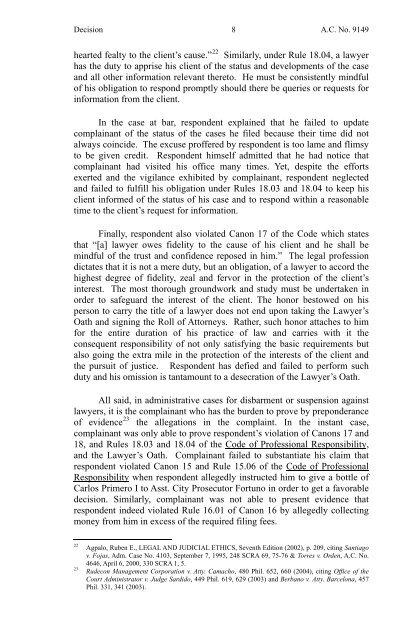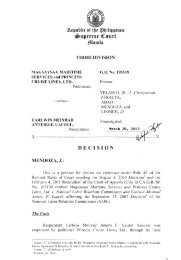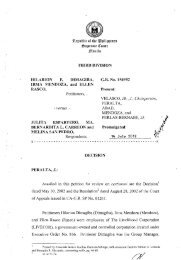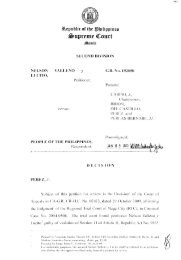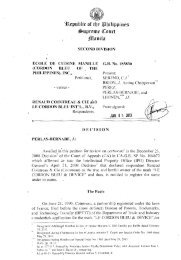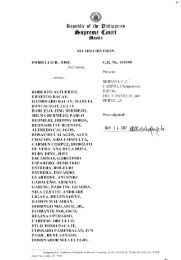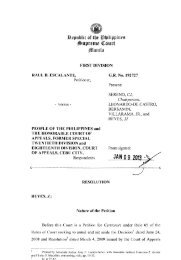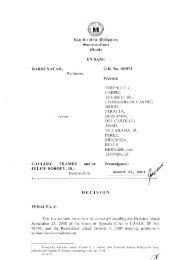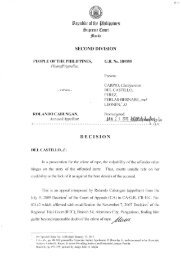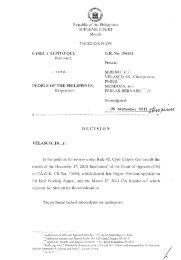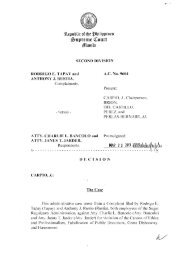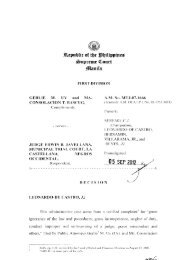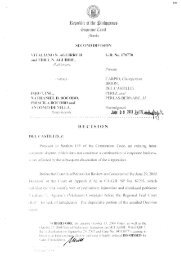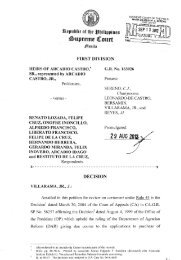A.C. No. 9149, September 4, 2013 - Supreme Court of the Philippines
A.C. No. 9149, September 4, 2013 - Supreme Court of the Philippines
A.C. No. 9149, September 4, 2013 - Supreme Court of the Philippines
Create successful ePaper yourself
Turn your PDF publications into a flip-book with our unique Google optimized e-Paper software.
Decision 8 A.C. <strong>No</strong>. <strong>9149</strong>hearted fealty to <strong>the</strong> client’s cause.” 22 Similarly, under Rule 18.04, a lawyerhas <strong>the</strong> duty to apprise his client <strong>of</strong> <strong>the</strong> status and developments <strong>of</strong> <strong>the</strong> caseand all o<strong>the</strong>r information relevant <strong>the</strong>reto. He must be consistently mindful<strong>of</strong> his obligation to respond promptly should <strong>the</strong>re be queries or requests forinformation from <strong>the</strong> client.In <strong>the</strong> case at bar, respondent explained that he failed to updatecomplainant <strong>of</strong> <strong>the</strong> status <strong>of</strong> <strong>the</strong> cases he filed because <strong>the</strong>ir time did notalways coincide. The excuse pr<strong>of</strong>fered by respondent is too lame and flimsyto be given credit. Respondent himself admitted that he had notice thatcomplainant had visited his <strong>of</strong>fice many times. Yet, despite <strong>the</strong> effortsexerted and <strong>the</strong> vigilance exhibited by complainant, respondent neglectedand failed to fulfill his obligation under Rules 18.03 and 18.04 to keep hisclient informed <strong>of</strong> <strong>the</strong> status <strong>of</strong> his case and to respond within a reasonabletime to <strong>the</strong> client’s request for information.Finally, respondent also violated Canon 17 <strong>of</strong> <strong>the</strong> Code which statesthat “[a] lawyer owes fidelity to <strong>the</strong> cause <strong>of</strong> his client and he shall bemindful <strong>of</strong> <strong>the</strong> trust and confidence reposed in him.” The legal pr<strong>of</strong>essiondictates that it is not a mere duty, but an obligation, <strong>of</strong> a lawyer to accord <strong>the</strong>highest degree <strong>of</strong> fidelity, zeal and fervor in <strong>the</strong> protection <strong>of</strong> <strong>the</strong> client’sinterest. The most thorough groundwork and study must be undertaken inorder to safeguard <strong>the</strong> interest <strong>of</strong> <strong>the</strong> client. The honor bestowed on hisperson to carry <strong>the</strong> title <strong>of</strong> a lawyer does not end upon taking <strong>the</strong> Lawyer’sOath and signing <strong>the</strong> Roll <strong>of</strong> Attorneys. Ra<strong>the</strong>r, such honor attaches to himfor <strong>the</strong> entire duration <strong>of</strong> his practice <strong>of</strong> law and carries with it <strong>the</strong>consequent responsibility <strong>of</strong> not only satisfying <strong>the</strong> basic requirements butalso going <strong>the</strong> extra mile in <strong>the</strong> protection <strong>of</strong> <strong>the</strong> interests <strong>of</strong> <strong>the</strong> client and<strong>the</strong> pursuit <strong>of</strong> justice. Respondent has defied and failed to perform suchduty and his omission is tantamount to a desecration <strong>of</strong> <strong>the</strong> Lawyer’s Oath.All said, in administrative cases for disbarment or suspension againstlawyers, it is <strong>the</strong> complainant who has <strong>the</strong> burden to prove by preponderance<strong>of</strong> evidence 23 <strong>the</strong> allegations in <strong>the</strong> complaint. In <strong>the</strong> instant case,complainant was only able to prove respondent’s violation <strong>of</strong> Canons 17 and18, and Rules 18.03 and 18.04 <strong>of</strong> <strong>the</strong> Code <strong>of</strong> Pr<strong>of</strong>essional Responsibility,and <strong>the</strong> Lawyer’s Oath. Complainant failed to substantiate his claim thatrespondent violated Canon 15 and Rule 15.06 <strong>of</strong> <strong>the</strong> Code <strong>of</strong> Pr<strong>of</strong>essionalResponsibility when respondent allegedly instructed him to give a bottle <strong>of</strong>Carlos Primero I to Asst. City Prosecutor Fortuno in order to get a favorabledecision. Similarly, complainant was not able to present evidence thatrespondent indeed violated Rule 16.01 <strong>of</strong> Canon 16 by allegedly collectingmoney from him in excess <strong>of</strong> <strong>the</strong> required filing fees.2223Agpalo, Ruben E., LEGAL AND JUDICIAL ETHICS, Seventh Edition (2002), p. 209, citing Santiagov. Fojas, Adm. Case <strong>No</strong>. 4103, <strong>September</strong> 7, 1995, 248 SCRA 69, 75-76 & Torres v. Orden, A.C. <strong>No</strong>.4646, April 6, 2000, 330 SCRA 1, 5.Rudecon Management Corporation v. Atty. Camacho, 480 Phil. 652, 660 (2004), citing Office <strong>of</strong> <strong>the</strong><strong>Court</strong> Administrator v. Judge Sardido, 449 Phil. 619, 629 (2003) and Berbano v. Atty. Barcelona, 457Phil. 331, 341 (2003).


